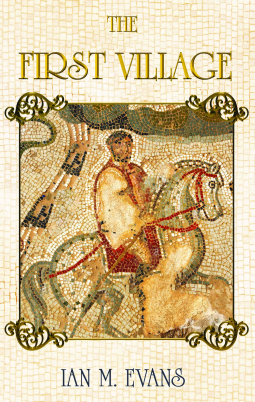
The First Village
by Ian M. Evans
This title was previously available on NetGalley and is now archived.
Send NetGalley books directly to your Kindle or Kindle app
1
To read on a Kindle or Kindle app, please add kindle@netgalley.com as an approved email address to receive files in your Amazon account. Click here for step-by-step instructions.
2
Also find your Kindle email address within your Amazon account, and enter it here.
Pub Date Mar 28 2019 | Archive Date Jun 22 2019
Talking about this book? Use #TheFirstVillage #NetGalley. More hashtag tips!
Description
An entertaining and lively tale of love and ambition set around the end of the Roman occupation of Britain, AD 383 and the threats it brings to a dependent way of life. A strong backstory is the force of the new state religion, Christianity.
Wales AD 383 is the most remote province of Roman-occupied Britain, colonised for over 300 years. Magnus Maximus, known to the Celts as Macsen Wledig, has grown restless with his role as general of the Roman army in Britannia. His nights are broken by dreams of an impossibly beautiful Welsh maiden. He sets his sights on moving his legions out of Britannia to challenge Gratianus - the emperor of the Western Roman Empire.
Flavius Arcadius is less than enamoured by his general's plans. The army's withdrawal will leave his family, neighbours and all of Britannia unprotected and at the mercy of internecine conflict between the local tribes and the even greater threat of pagan invaders from the east. He does, however, have a vision for the future - a fortified villa surrounded by a self-sufficient community - if only he could find a way to stay behind when the legions move.
Flavius starts to plot...
Maximus is sufficiently in thrall to his fantasies to allow Flavius to set out with his two friends and fellow officers, Severus and Caradocus, to seek out, abduct and take this dream girl to him as his bride...
The three soldiers wander through the wilds of Cymru, intent only on delaying their return. To their astonishment, they come across a young woman who is the living image of Maximus's dream maiden. Flavius and Severus are determined to bring the girl, Elen, to Maximus. Caradocus, however, engineers their escape.
Elen's beauty is matched by her wit and intelligence; and her courage is demonstrated when she saves them both from capture. Before long, the two runaways are in love. But Caradocus and Elen are going to need more than their wits to survive, when they are being hunted - not just by Flavius and Severus, but by Elen's father and, for all they know, the full might of the Roman army...
The First Village is available for purchase in print and ebook formats.
Available Editions
| ISBN | 9781784655334 |
| PRICE | |
Links
Average rating from 10 members
Featured Reviews
 Jacqui H, Reviewer
Jacqui H, Reviewer
The story essentially covers the later part of the Roman occupation of Britain, focussing upon what is now Wales, set in AD 383. The general of the Roman Army, Magnus Maximus, has grander ideas for himself and heads off with his Legions to try to become emperor of the Western Empire. Other than being infatuated with a dream woman he gives little real thought to what would happen to the natives and Romanised people left behind. Three of his officers come up with a plan to try to find this dream girl as they do have concerns about those being left behind and really want out of things anyway. They do in fact, much to their amazement, find such a girl, the youngest daughter of a local chieftain and they fall into conflict with each other as a result. At one level it all gets a bit silly and farcical - she runs off with one of the officers, falls for him and on to a logical end, Papa chieftain wants revenge, the other soldiers start thinking about consequences, However, the story is mainly about the effects of the disappearance of Roman military on locals - a market economy suddenly without the market or at least the money and support and authority. There are well-off people in villas and they start thinking about self sufficiency with the story suggesting that they grew little - archaeological evidence would strongly contradict this. This was a period when Romans had mostly become Christians although the old Pagan gods were still worshipped - a time of generally remarkable tolerance in fact. There is therefore a lot of discussion about trying to do good unto others, helping those less well-off and so on. There is certainly a lot of thoughtful and thought provoking dialogue going on amidst the slight silliness. The characters are well-drawn overall; personally I like the Roman names and was pleased to see the towns, forts etc having their Roman names retained. As far as I'm concerned they fall easily from the tongue but that's probably helped by having worked on Roman sites across Hadrians Wall and northern Britain for over 30 years. At first the modern dialogue and every day speech sat oddly with the Roman theme but after a while it fitted better - after all the reader isn't going to read Latin, High or Low, so colloquial conversations between fellow soldiery comes over better with modern " kick their backsides" type comments. An engaging read and I really felt for the main characters at the end. Thanks to NetGalley and Vanguard Press for an advance copy in exchange for my honest review.
Readers who liked this book also liked:
Marie Bostwick
Historical Fiction, Literary Fiction, Women's Fiction


















